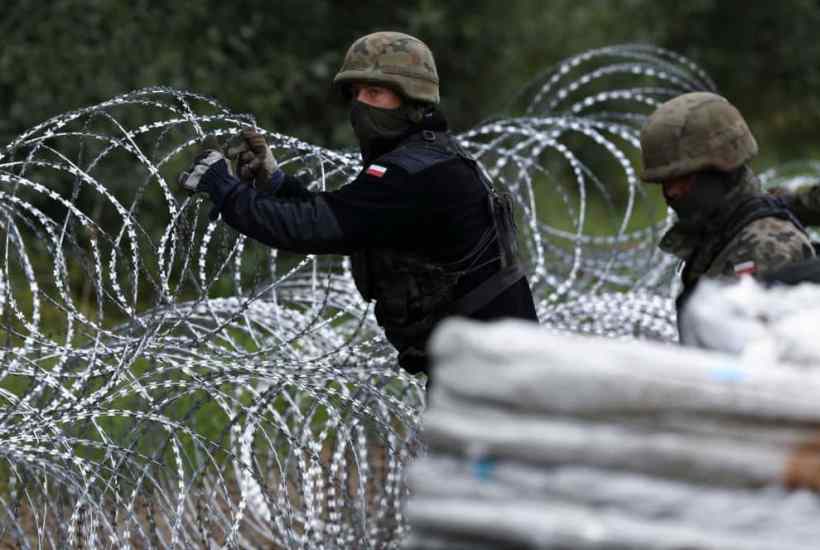The EU’s conflict with Belarus is heating up. The simmering migrant crisis on the Polish border with Belarus exploded into a new level of intensity on Monday, as large groups of migrants marched through Belarus towards Poland before attempting to storm barbed wire fences and force their way into the Schengen zone.
The Polish government responded to the violation of its border with military force. Twelve thousand troops are now being deployed along the border. When migrants managed to break a section of the fence near Kuznica on Monday, a rank of Polish soldiers filled the gap as a military helicopter flew low overhead in an attempt to deter the febrile group, which was chanting ‘Germany!’ It’s thought that around 7,000 of the migrants who recently entered Poland subsequently tried to make it to Germany. Another 14,000 migrants are thought to be in Belarus hoping to make the crossing.
Yet in stopping the migrants’ desperate attempts to reach Europe, Poland has yet to engage with the force responsible for bringing them to the Schengen zone in the first place. Across the border, Belarus has been encouraging migrants to fly from war-torn Middle Eastern countries to Minsk; its soldiers have been directing them to the forests by the border to set up camp.
Those who pass near the Poland-Belarus border have been receiving text messages from the Polish authorities warning about Belarus’s malevolent actions.
‘The Polish border is sealed. Belarusian authorities told you lies. Go back to Minsk! Don’t take any pills from Belarusian soldiers,’ the messages read. The reference to pills follows claims from the Lithuanian authorities that Belarusian border guards have been handing out ‘strange pills’ to help migrants survive the physical ordeal of their attempted border crossing. These pills supposedly contain methadone.
Polish reports also suggest that high-level Belarusian security figures are actively involved in attempts to help migrants cross the border. It is believed the head of public security from the nearby Grodno region in Belarus is personally supervising the operations; the same man is alleged to have led a brutal crackdown on anti-regime protests in Grodno in 2020. But what does Belarus’s dictator, Alexander Lukashenko, stand to gain from deceiving migrants into believing that they are being offered a sure route into the EU?
The migrant crisis is the latest strategic move in escalating tensions between Belarus and the EU in recent months, involving hefty economic sanctions from Brussels and ever-harsher rhetoric from both sides. Lukashenko is accused by Poland of attempting to destabilise the EU by bringing migrants to the Schengen border: the latest, violent events at Kuznica suggest he has achieved this aim and more.
The arrival of huge numbers of migrants at the border has already started a domino effect in countries further to the west. German neo-Nazi organisations have taken to prowling the country’s border with Poland in preparation for an imminent ‘invasion’. Calls from the West for a humanitarian response to the bands of migrants camped out in the cold at the Polish border may have been strong over recent months, but such sympathetic responses are likely to be in shorter supply when those groups try to cross borders en masse and by force.
Calls for Poland to offer asylum to those stuck at the border will still likely persist though, due in large part to the horrendous hardships which many migrants are facing. Bodies have been discovered in fields, woods and rivers along the border in recent months, as hunger and harsh weather push those stranded beyond the limits of human endurance.
Each of these deaths has been met with despair from humanitarian aid groups as well as Poland’s liberal media. The issue has become sorely divisive, and it is this internal discord which was likely Lukashenko’s primary motivation for instigating the crisis. Europe was riven with divisions during the Syrian refugee crisis in 2015. Now, a new influx of migrants from the Middle East is again forcing the bloc to examine its moral conscience. Cold and calculating Lukashenko has manufactured an unsolvable problem for the EU: let migrants in and by doing so bow to the malevolent acts of a foreign state; or leave them to suffer and die, and cast the bloc as heartlessly abandoning those fleeing war-torn countries.
Yet as migrants form in larger groups and become more violent, support for their cause is likely to decrease. Indeed, opposition leader Donald Tusk adopted a notably tougher stance on the issue after images of clashes emerged from the border on Monday and following a recent incursion into Polish territory by Belarusian border guards. He called for the triggering of Nato’s Article 4, which calls for members to consult if ‘the territorial integrity, political independence or security of any of the parties in threatened.’
It is possible, then, that Lukashenko may finally have overplayed his hand in bringing a migrant crisis to the EU’s doorstep. A humanitarian drama is now in danger of transforming into a military one. The question now is exactly how hot the conflict at the Polish border could get.
<//>
Got something to add? Join the discussion and comment below.
Get 10 issues for just $10
Subscribe to The Spectator Australia today for the next 10 magazine issues, plus full online access, for just $10.




















Comments
Don't miss out
Join the conversation with other Spectator Australia readers. Subscribe to leave a comment.
SUBSCRIBEAlready a subscriber? Log in